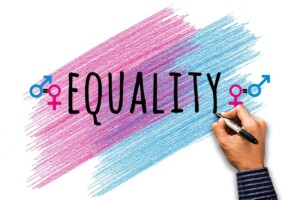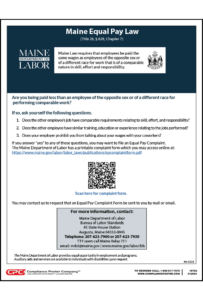 On April 12, 2019, Maine’s first female Governor Janet Mills signed Senate Bill 90, or “An Act Regarding Pay Equality,” into law. The new law, which goes into effect 90 days after the current legislative session ends, seeks to end wage inequality in the state by prohibiting employers from taking salary history into account when setting compensation for a new employee.
On April 12, 2019, Maine’s first female Governor Janet Mills signed Senate Bill 90, or “An Act Regarding Pay Equality,” into law. The new law, which goes into effect 90 days after the current legislative session ends, seeks to end wage inequality in the state by prohibiting employers from taking salary history into account when setting compensation for a new employee.
The new law will also allow the Maine Human Rights Commission to use compensation history inquiries as evidence of discrimination, and give employees more freedom to discuss wages in the workplace for the purposes of achieving pay equality.
Maine Pay Equality Law: Why is it needed?
Although opinions differ as to the cause, the wage gap between male and female workers persists even today – on average, women earn roughly 80% of what men earn over the course of a lifetime. Researchers have also found that wages for members of other protected classes, such as people of color and LGBT individuals, trail behind due to discriminatory practices and other factors which affect compensation.
Some equality advocates have argued that the common employer practice of using salary history to determine a new employee’s starting pay, while not necessarily discriminatory in and of itself, can perpetuate the problem of pay inequality. When salary history is taken into account, a discriminatory pay practice from one employer can impact a person’s salary through the course of their entire career.
In order to diminish the effects of discrimination and promote pay equality, states and municipalities have recently begun passing laws which prohibit employers from requiring a new or prospective employee to provide information on their previous salary or compensation. Maine is the 8th state in the U.S. to pass a salary history ban.
Maine Salary History Ban: What Employers Need to Know
The new law explicitly prohibits an employer from inquiring about or “using” the compensation history of a prospective employee before an offer of employment, including all terms of compensation, has been negotiated and made. The prohibition applies to inquiries directed at the prospective employee as well as inquiries directed at a current or former employer. After a complete offer has been made, the employer is permitted to inquire about or confirm the prospective employee’s compensation history.
Employers who violate the law may be subject to a penalty of between $100 and $500, as well as a civil action brought by or on the behalf of the employee or prospective employee. However, employees who violate the prohibition on compensation inquiries will also be exposing themselves to potential complaints under the Maine Human Rights Act and the Maine Equal Pay Law. The new law states:
“Evidence of unlawful employment discrimination under section 4572 [of the Maine Human Rights Act] and Title 26, section 628 [the Maine Equal Pay Law] includes, but is not limited to, an employer’s inquiring, either directly or indirectly, about the compensation of a prospective employee… or otherwise seeking the compensation history of a prospective employee” (SB 80 – LD 278/ 5 MRSA 4577).
 While the Maine Equal Pay Law only covers discriminatory pay practices which are based on sex, the Maine Human Rights Act prohibits employers from discriminating against an applicant for employment because of race or color, sex, sexual orientation, physical or mental disability, religion, age, ancestry or national origin. This suggests that an employer’s compensation history inquiry may be used as evidence of discrimination towards a protected class other than sex.
While the Maine Equal Pay Law only covers discriminatory pay practices which are based on sex, the Maine Human Rights Act prohibits employers from discriminating against an applicant for employment because of race or color, sex, sexual orientation, physical or mental disability, religion, age, ancestry or national origin. This suggests that an employer’s compensation history inquiry may be used as evidence of discrimination towards a protected class other than sex.
An employer or employment agency’s inquiry about compensation history will not be considered evidence of discrimination if it occurs after an offer of employment which includes terms compensation has been made. The law also makes an exception for circumstances in which an employee or prospective employee voluntarily discloses information about their compensation history . In such a case, the employer or employment agency is permitted to seek confirmation or permit the prospective employee to confirm the information prior to making an offer of employment.
The general ban on salary history inquiries does not apply to any employer who makes a request in compliance with a federal or state law which requires the disclosure or verification of compensation history information.
What else do employers need to know?
The new law also expands wage transparency protections for employees. Currently an employer may not prohibit an employee from disclosing the employee’s own wages or inquiring about another employee’s wages, if the purpose of the employee’s actions is to enforce the equal pay protections guaranteed by the law. The new law states that an employer additionally may not prohibit an employee from disclosing another employee’s wages for the purposes of enforcing equal pay protections.
The Maine salary history ban, and all other provisions of the new law, will go into effect 90 days after Maine ends its current legislative section. The current projected adjournment date is June 19, 2019, making the projected effective date for the new law September 17, 2019. Employers should review existing job applications and hiring policies, as well as policies regarding wage discussion in the workplace, to ensure compliance with the new law before it goes into effect.
KEEP IN TOUCH WITH CPC!
To keep up with the latest in labor law news and posting compliance, follow us on Facebook, LinkedIn, or Twitter or subscribe to this blog! You can also contact us by phone, email, or chat to order one of CPC’s signature labor law compliance products or learn more about your company’s individualized posting obligations.
Please keep in mind that CPC cannot provide legal advice. If you have a question about how labor law applies to your specific workplace situation, please consult your local labor department or an employment lawyer.
|
|

